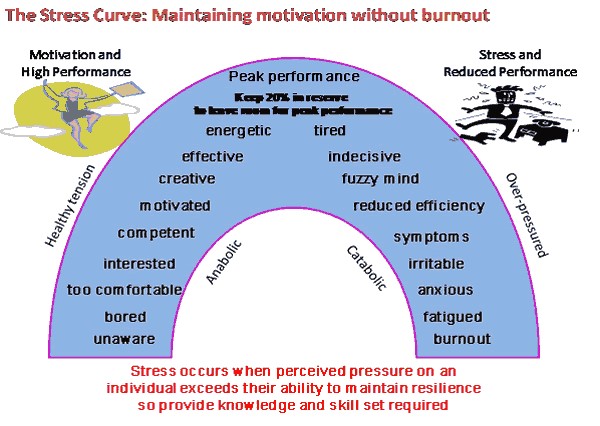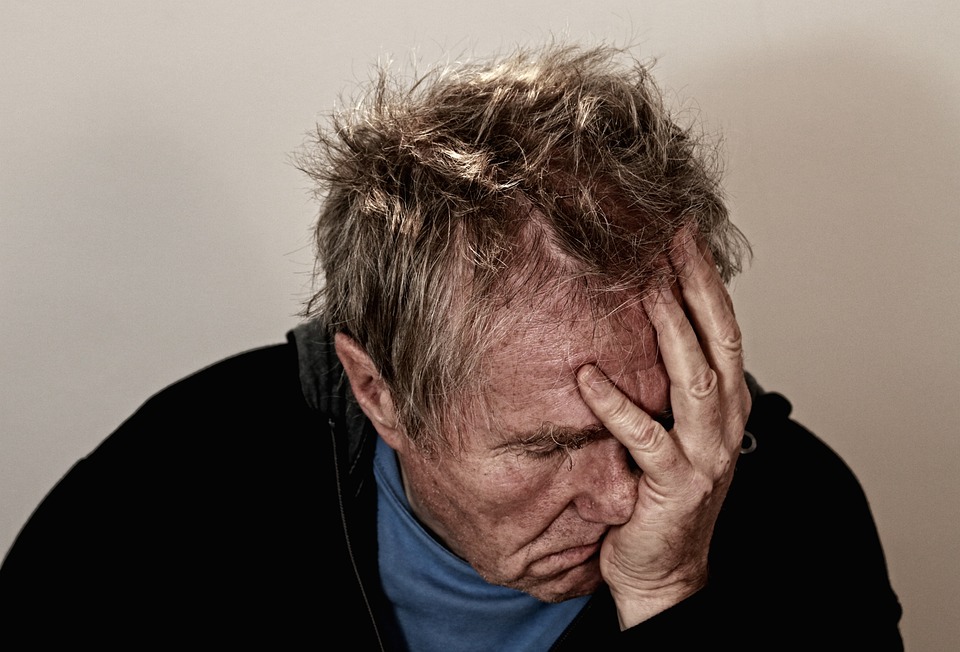As International Stress Awareness Week passes, let’s take the ‘stress definition’ as the launch pad for this blog. We all need stress and challenge, and too little stimulation can be just as stressful as too much. On the whole, the challenges we face in our daily lives keep us active, engaged and alive, in constant vigilance for potential threats. When the perceived pressures in our life are too great for our ability to cope with them however, we are in the danger zone of sustained stress.
What happens when you go over the top of the “pressure stress gauge” (more below!), and into the hinterland of too much pressure? Then stress takes centre stage. The body/mind will signal distress (with symptoms varying for everyone, from muscular tightness to extreme fatigue), and will affect performance. You have moved beyond your tolerance and anxiety for the situation you find yourself facing.

Take a look at the diagram above and see what your individual signals are. If you’re beyond the tipping point, performance slows down and you are held in “fight, flight, freeze or fold”, with your characteristic symptoms (such as tiredness, physical pain, headaches, fatigue, IBS or anxiety etc.). This is linked, together with emotional hijack, to impaired thinking. Have you been there? I certainly have.
Our books Reclaim Health and Emotional Healing for Dummies (particularly Chapter Two of the latter), demonstrate the profound danger to ourselves and our healthy inner state, if stress is prolonged and leads to an inflammatory state of danger. The metabolism becomes overdriven (catabolic). The shift in immune protection from physiological TH1 to physiological TH2 sets the stage for inflammation and dysfunction. In the body, defence against infection is via the TH1 system, where antibodies are produced. In the TH2 response, the bodies inflammatory markers such as cytokines increase.
I move later onto my own personal view on what protects us from these stress-related responses, primarily strategies based on mindfulness and self-awareness.

What happens to you when you experience overload, and the symptoms of the downwards slope? These negative symptoms (such as anxiety and depression) can often lead to absence from work or school. Mental ill-health is the third biggest cause of absence in the workplace. In 2017/8, 15.4 million working days were lost due to work-related stress, depression or anxiety. That’s 44% of all work-related ill-health cases, and nearly 60% of all working days lost!
Why are we always on the go, working crazy hours and not taking a lunch break!? By not saying no we can’t find a balance between activity and rest.
We need to abide by the ultradian rhythm, which is described in the 20 Minute Break by Ernest Lawrence Rossi. For example, working 20 minutes should be followed by 5 minutes recharging, or 40 minutes should be followed by 10 minutes! In the age of mobile phones and social media, we are often working on our social networks, when we’re meant to be relaxing. For some people, their perceived place in the pecking order is of great importance. We are social animals, as David Brook’s book The Social Animal: A Story of How Success Happens makes clear. We get an uplift in mood and well-being from good social contacts.

So much of mental health issues are over-medicalised. In my own experience, what Doctors diagnosed as depression was actually vital exhaustion. Recovery occurred, as in the example below, by self-care in a healing environment:
“The time I myself came close to breaking down was the result of not treating myself with care and attention. In the New Year after a very busy Christmas as a GP, I was looking after two terminally ill patients at home. One of them was dying of breast cancer in very similar circumstances leading up to my first wife’s death. It was all too much, and in the early New Year I got influenza. I was floored and could not regain any kind of energy and retained a restless active mind with poor sleep. I went to my GP and said that I felt that I needed a break – probably as much as 3 to 4 weeks and I had locum cover to protect my partners. I instituted a restorative program (sleep – massage – music – compassionate care) and planted a hedge when recovering my own pleasure in the open air. I refused antidepressants. My normal Doctor was away, and the locum wrote “prolonged fatigue after flu” on my medical certificate, after a week of insisting on depression on my certificate, which I did not want and didn’t have. When he substituted prolonged fatigue, my locum insurance was withdrawn!”
What are the solutions?
Print and pin the “Pressure Stress Gauge” at the top of this blog in a prominent place at work and at home. We all need regular breaks (as described above), where it is often helpful to stretch as well. If you notice any of your particular stress signals, become aware of their presence and pause for a mini break. Stop, ground yourself, and say silently ‘slow down, this moment is precious now’. Sink into the breath and be present whilst you take five slow breaths with a prolongation of the out-breath, which becomes longer than the in-breath. A breathing count of four seconds for each in-breath and six seconds for each out-breath (i.e. one complete cycle in 10 seconds) is ideal.
As you breathe it is important to use the diaphragm as a bellows. Unfortunately, many people hold onto the stress pattern of breathing into the upper chest on the-in breath. It may help you to follow my YouTube David Beales Mindful Breathing Meditation and rehearse awareness of a diaphragmatic breath. At six breaths per minute you are enhancing your relaxation response and a physiological measurement called Heart Rate Variability is maximised. If you are hard-pressed, see if you’re also able to bring in a feeling through the heart of gratitude as you breathe in. This feeling also enhances the effectiveness of this technique.
Spending your mini-rest bringing about your relaxation response is an act of self-preservation in an often frantic world, and can be particularly helpful at night before sleep.

Deep Sleep
My friend Phil sent me a post today from Apple news, from a science paper published in Wired UK titled ‘This is how good night sleep cleans toxins from your brain.’
Phil summarised: ‘It seems that synchronised brainwaves in the non-REM deep sleep are likely to play a key role in preventing toxins from accumulating in your brain. All the ‘gunk’ produced by the brain during the day is washed away by spinal fluid during deep sleep. Sound, good quality sleep could prevent Alzheimer’s and may become an important component in treating brain related conditions. I like the concept of brainwashing – a positive spin on a negative association.’ Phil uses a watch (that I now use as well!) which measures your deep sleep patterns.
The feeling of being revved up with a restless mind can be reduced by a deliberate strategy. I personally use mindfulness and meditation, as well as breath-work. However it is so easy to get into the down-slope, and then a need to withdraw and really think through a strategy is key. What actions will you take? Your feedback and thoughts on this blog would be appreciated.

Very interesting blog- I definitely think that stress is one of the leading contributing factors to illness, and yet still not really recognised or measured enough when looking at a persons heath as a whole. Modern life is stressful!! I find yoga resets me each week and a good way of de-stressing….
LikeLike
Thanks Al. It’s good to know your characteristic symptoms under too much pressure. For me always been my upper body particularly my shoulders becoming stiff and waking early with fatigue. Taking those mini breaks – when I do it!-Is always helpful. Good that you have a yoga class to help you recharge your batteries. Love dad xx
LikeLike
Thanks David, makes so much sense.
The Anthropocene human is one whose body has changed – not as a result of evolution but in response to the environment we have created. This human created environment doesn’t, normally, require the stress response that enabled our species to flourish and replace natural evolution with technological evolution.
LikeLike
Thanks Rob for your comment suggesting that modern society has not adapted to present technological challenges. I think our present society works with a high level of threat to our human needs. To stay functional we need challenge, where the purpose or goal is achievable, and leads to celebration as the challenge challenge /threat /stress response winds down with a celebration of the achievement. We often hardly have time to breathe before the next challenge and celebration is often in short supply.
LikeLike
I think that nowadays where life moves so fast, time is pressured and social media is everywhere around us, that we all suffer from stress whatever our age.. Yoga exercises and breathing have been an essential part of my life since I was 20, as have my animals and time spent quietly outside in the fresh air, whether pottering in the garden, galloping on my pony after mucking out her stable, going for a walk, being creative with art, writing etc( although can feel hard) relaxing and having fun with friends, my family and other animals, doing things for others and having activities/ hilights to look forward to- whether a meal out, trip to the cinema, art gallery etc , a holiday, a chat and drink with Charles , a good book, relaxing by the fire on the sofa(winter) or in the garden In summer or a tv supper in my pyjamas watching my current favourite tv programme .. gosh what a lot .. I also love a solo wee dram
Of whisky late at night after a busy day and reflecting quietly …xxx
LikeLike
Thanks so much for replying. You seem to have thought about the balance between activity, rest and restoration and have a great program. Do you get your characteristic downslope symptoms when you gone beyond your limit of toleration or anxiety for the situation you find yourself facing?
I have been conscious of doing too much of late and I started a sleep, meditation time more clearly defined, revamped my week doing less and with more time for friends and music. As well as a more regular exercise program with weekly yoga. I feel better already. With love and good wishes, David
LikeLike
David,
I have always valued your remarkable work. It’s more pertinent with your own experience and how your skill, self training and intuition create such helpful techniques that are needed for restorative health in modern life. I was and remain grateful having worked with you but also healed through your skilled approach. Your blog certainly comes at the very challenging time for me and act as a good reminder to engage your teaching once more.
Thank you
LikeLike
Hi Ashley, thank you for your kind comments I too enjoyed working with you very much.
Your ability to move your skills and talents into your new venture and achieve success in such a short time pays tribute to your creativity and hard work. You’re such a great people person that many of your previous clients will have missed your sure touch, care and follow-through. Do come and see us in Kew if planning a trip to London.
Namaste, David
LikeLike